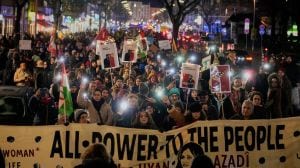Egyptian face-off
There is no alternative to talks. Normalcy in Egypt is crucial for Middle Eastern stability
There is no alternative to talks. Normalcy in Egypt is crucial for Middle Eastern stability
What was different about the protests across Egypt and the crowds that gathered in Cairos Tahrir Square on the completion of President Mohammed Morsis first year in office on Sunday,was the fact that the liberal,leftist and secular opposition groups have finally come together under the grassroots Tamarod Rebellion movement. They have been joined by ordinary Egyptians angered by Morsis political and economic policies. Their message: a candid,and loud,Leave! The presidents approval ratings have plummeted to 32 per cent from 78 per cent at the end of his first 100 days. With a number of deaths already reported in clashes,the possibility of more violent showdowns is enhanced by the threats of Morsis supporters to hold counter rallies.
As the candidate of the Freedom and Justice Party,the political arm of the Muslim Brotherhood,it was imperative for Morsi to walk a fine line. His has been the challenge to balance Egypts socio-economic aspirations with the Brotherhoods ideology. But before all else,he had to ensure his governments legitimacy,and for that,wage a battle with the army and the judiciary. Morsi subdued the military in August 2012,but the Supreme Constitutional Court holds its own even today,having invalidated parliamentary elections last year and rejected Morsis attempts to advance polls to April this year. In fact,Morsi has not breathed easy ever since popular protests forced him to rescind the November 2012 presidential decree stripping the judiciary of the right to challenge his decisions.
While the pragmatic maturity he has displayed in foreign policy has brought him a measure of success,the anger against Morsi at home is primarily triggered by his failure to deliver on the economy marked by large-scale unemployment in a young and aspiring population,falling living standards,expanding power cuts and water shortages,as well as paralysing strikes by government employees. Filling institutional posts with hardline Islamists,putting them in charge of 13 of Egypts 27 governorships,for instance,hasnt helped. US President Barack Obamas message to both sides of the Egyptian divide to engage in a more constructive conversation should be heeded. Egypt,as the erstwhile and aspiring heart of the Arab world,is key to Middle Eastern stability. If its democratic consolidation fails,the tremors will rock a region already riven by the Syrian civil war.
- 01
- 02
- 03
- 04
- 05































